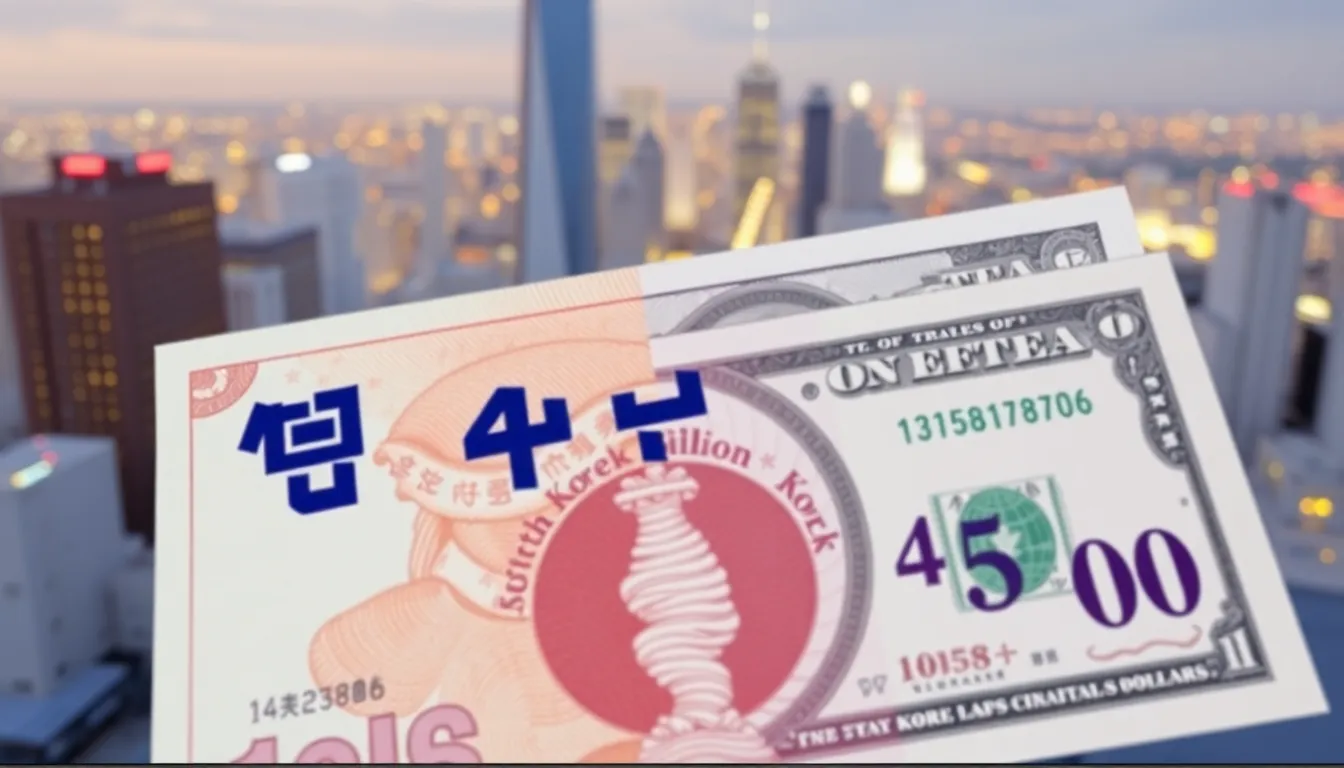Table of Contents
ToggleWhen it comes to converting currency, numbers can feel like a foreign language. Take 456 billion won, for instance. It sounds like a lot—because it is! But how much is that in good ol’ US dollars? If you’ve ever wondered how much purchasing power that hefty sum carries across the ocean, you’re not alone.
Understanding Currency Conversion
Currency conversion plays a crucial role in international finance, influencing how individuals perceive the value of foreign currencies. Conversion from 456 billion won to US dollars exemplifies the broader challenges in understanding monetary value across different currencies.
The Significance of Exchange Rates
Exchange rates determine how much one currency can be exchanged for another. They fluctuate based on various factors such as economic stability, interest rates, and inflation. A robust economy typically leads to a stronger currency, while economic uncertainty can weaken it. Awareness of these rates is essential for making informed financial decisions. For instance, a small change in the exchange rate could significantly impact the value of a large sum like 456 billion won, affecting purchasing power in USD.
Tools for Currency Conversion
Many tools facilitate easy currency conversion, allowing individuals to calculate values instantly. Online currency converters provide real-time rates based on current market conditions. Mobile apps also offer quick access, enabling users to convert currencies on the go. Financial institutions often display current exchange rates prominently, ensuring transparency. Additionally, some websites provide historical data, allowing users to analyze trends and make predictions about future movements. Utilizing these tools can simplify understanding complex currency exchanges.
Current Exchange Rate for Won to USD

The current exchange rate between the South Korean won and the US dollar plays a vital role in understanding the value of 456 billion won. As of the latest financial data, 456 billion won equates to approximately $380 million. This value fluctuates due to various economic factors.
Recent Trends in Currency Value
Currency values have experienced notable fluctuations in recent months. The exchange rate for won to USD has displayed both rises and falls, influenced by global economic conditions. Recently, the won strengthened against the dollar due to improved economic indicators in South Korea. Data sourced from financial institutions shows shifts in the exchange rate, with values reaching 1,200 won per dollar during certain periods. Such trends affect the purchasing power of significant amounts like 456 billion won.
Factors Influencing the Exchange Rate
Several factors impact the won to dollar exchange rate. Economic stability is a primary consideration, as stability often attracts foreign investment. Interest rates set by the Bank of Korea also play a critical role, influencing capital flows and currency demand. Inflation levels further contribute to this dynamic; lower inflation can increase a currency’s value. Political stability additionally affects investor confidence, which subsequently drives currency valuation. Understanding these factors aids in making informed financial decisions regarding currency exchanges.
Converting 456 Billion Won to USD
Understanding the conversion of 456 billion won to USD involves several straightforward steps. Current exchange rates show that 456 billion won converts to approximately $380 million.
Step-by-Step Conversion Process
- Identify the current exchange rate. Exchange rates fluctuate based on economic indicators.
- Use the formula: Amount in won divided by the exchange rate. This allows for accurate calculations.
- For example, if the exchange rate is 1,200 KRW per USD, divide 456,000,000,000 by 1,200. The outcome reveals the USD equivalent.
Calculating currency conversion accurately is essential for financial decisions. Real-time data from reliable sources aids in accuracy.
Implications of Large Currency Conversions
Large currency conversions impact financial planning significantly. A conversion such as 456 billion won brings about considerable purchasing power in USD.
Understanding fluctuations in exchange rates can affect investment strategies. Economic stability, inflation, and interest rates play vital roles in these calculations.
Unexpected changes in the exchange rate can lead to losses or gains when dealing with large amounts. Knowing how to navigate these implications helps in managing resources effectively.
Economic Impact of Currency Fluctuations
Currency fluctuations significantly affect economic activities, influencing trade and investments. Variations in exchange rates can shift the competitive landscape for imports and exports.
Import and Export Dynamics
Exchange rate volatility often impacts import and export dynamics. A stronger South Korean won makes imported goods cheaper for domestic consumers, potentially increasing demand for foreign products. Conversely, when the won strengthens, South Korean exports may become more expensive for international buyers. Exporters might face challenges in maintaining competitive pricing, affecting their market share. Recent trends indicate that fluctuations in the won’s value can directly influence trade balances and economic growth.
Effects on Investment and Trade
Fluctuating exchange rates also affect investment decisions. Investors typically assess the currency value alongside economic indicators to determine potential returns. A stable exchange rate alongside robust economic indicators often attracts foreign investments. However, when currencies fluctuate dramatically, it can deter investment due to perceived risks. Investors may seek opportunities in stable economies, leading to shifts in capital flow. These dynamics underscore the importance of monitoring currency values to make informed financial decisions.
Understanding the conversion of 456 billion won to USD reveals the intricacies of currency exchange. The fluctuating nature of exchange rates highlights the importance of staying informed about economic indicators.
Investors and individuals alike can benefit from recognizing how these rates impact purchasing power and financial decisions. Tools for real-time currency conversion simplify the process, making it easier to navigate these complexities.
As the global economy evolves, keeping an eye on exchange rates will continue to be vital for anyone dealing with significant currency amounts.







